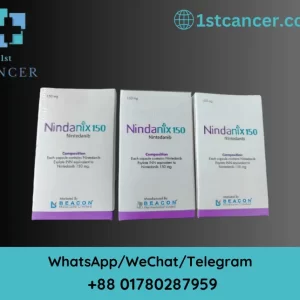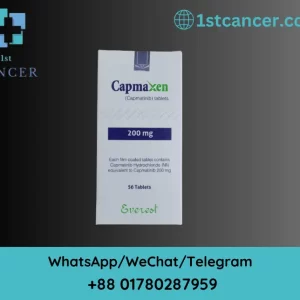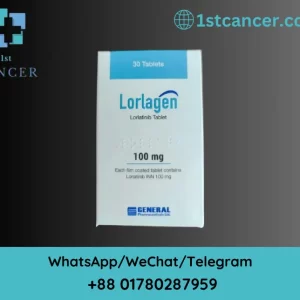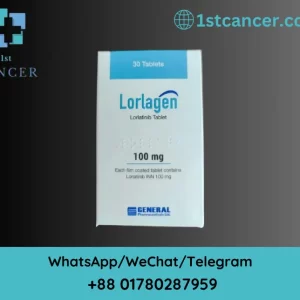Mobocertinib (Moboxen) Capsules is an oral medication available in capsule form. Exkivity is the marketed brand name for capsules containing the active ingredient mobocertinib. This medication treats NSCLC in patients with EGFR exon 20 insertion mutations using a tyrosine kinase inhibitor.
Patients take Mobocertinib (Moboxen) Capsules orally because these capsules have been designed to target tumors with this specific mutation. This mutation can cause uncontrolled cell growth and contribute to the progression of cancer. Mobocertinib inhibits this mutation to slow or stop cancer growth in NSCLC patients with this genetic alteration.

Healthcare professionals typically provide dosage and administration guidelines for mobocertinib, and patients should follow the prescribed instructions. Follow your provider’s dosage and schedule and discuss concerns with your doctor.
Drug information changes over time due to research, clinical trials, and updated prescribing guidelines. To stay up-to-date on Mobocertinib (Moboxen) Capsules, including usage, side effects, and developments, consult a healthcare professional or refer to recent resources.
What is Mobocertinib (Moboxen) used for?
The duration of mobocertinib treatment can vary based on individual factors and the specific response to the medication. Healthcare professionals typically determine the duration of treatment based on ongoing assessments of the patient’s condition, the effectiveness of the medication, and the occurrence of any side effects.
Individualized Treatment Plans:
Healthcare professionals often individualize the duration of mobocertinib treatment, considering factors such as the stage of cancer. The presence of specific genetic mutations, the overall health of the patient, and the response to the medication. Healthcare providers may periodically reassess the patient’s condition through imaging studies, laboratory tests, and clinical evaluations to determine the continued appropriateness of mobocertinib as part of the treatment plan.
Response to Treatment:
The assessment of the response to mobocertinib is a crucial aspect in determining the duration of treatment. In cases where the medication is effectively controlling the cancer and demonstrating positive outcomes. Healthcare professionals may recommend continuing the treatment to maintain its benefits.
Potential Adjustments:
In some situations, adjustments to the treatment plan may be considered. This could involve changes in dosage, temporary interruptions, or, in rare cases. Discontinuation of mobocertinib based on factors such as disease progression, intolerable side effects, or the emergence of new treatment options.
Ongoing Monitoring:
Regular monitoring is essential throughout the course of mobocertinib treatment. This allows healthcare providers to track the patient’s response. Manage potential side effects, and make informed decisions about the continuation or modification of the treatment plan.
Patient-Provider Collaboration:
Effective communication between patients and healthcare providers is crucial in determining the optimal duration of mobocertinib treatment. Encouragement is given for patients to openly discuss their experiences, any concerns, or changes in their health with their healthcare team. This collaborative approach ensures that treatment decisions align with the individual needs and preferences of the patient.
Conclusion:
Healthcare professionals tailor the duration of mobocertinib treatment to each patient’s unique condition, as it varies. As ongoing research provides more insights into the long-term efficacy and safety of mobocertinib, treatment guidelines may evolve. Individuals undergoing mobocertinib treatment should maintain regular follow-up appointments with their healthcare providers to facilitate ongoing assessment. Adjustments to the treatment plan as needed. And discussions about the overall management of their cancer. Patients should consult with healthcare professionals or refer to updated sources for the most recent information on the duration of mobocertinib treatment. Acknowledging the dynamic evolution of medical information over time.
How effective is Mobocertinib (Moboxen)?
mobocertinib has shown effectiveness in the treatment of non-small cell lung cancer (NSCLC) with specific genetic mutations. The primary indication for mobocertinib is in adults with metastatic NSCLC who harbor epidermal growth factor receptor (EGFR) exon 20 insertion mutations. Here are key details regarding the effectiveness of mobocertinib:
Clinical Trials and Approval:
The approval of mobocertinib was based on clinical trial data, including the phase I/II EXCLAIM study (NCT02716116). This study investigated the safety and efficacy of mobocertinib in patients with NSCLC characterized by EGFR exon 20 insertion mutations. The results of the trial demonstrated promising outcomes, with mobocertinib showing effectiveness in this specific subset of patients.
Response Rates:
Clinical trial data indicated notable response rates in patients with EGFR exon 20 insertion mutations.
Duration of Response:
While the duration of response can vary among individuals, clinical trial data suggested. That patients treated with mobocertinib experienced meaningful and durable responses. The duration of response refers to the period during which the cancer remains under control or shrinks in response to the medication.
Adverse Events:
Like any medication, mobocertinib is associated with potential side effects. Common side effects include diarrhea, rash, nausea, and fatigue. Evaluating the effectiveness of mobocertinib necessitates considering its overall safety profile, with healthcare professionals weighing the benefits against potential risks.
Individualized Treatment Approach:
The effectiveness of mobocertinib is often assessed on an individual basis, considering factors such as the patient’s overall health. The stage of cancer, and the specific genetic characteristics of the tumor. Healthcare professionals may tailor treatment plans based on ongoing evaluations and discussions with patients.
Conclusion:
Mobocertinib represents a significant advancement in the treatment landscape for NSCLC with EGFR exon 20 insertion mutations. Clinical trial data has supported its effectiveness in providing meaningful responses. And disease control in a patient population that historically faced challenges in finding suitable treatment options. It is important to seek advice from healthcare professionals when considering the use of mobocertinib, as with any cancer treatment. They can take into account the patient’s medical history. Condition and potential risks and benefits in order to make an informed decision.





